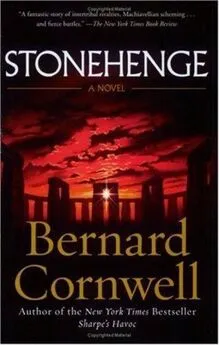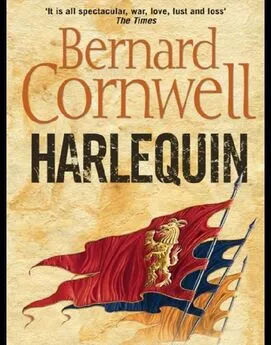Bernard Cornwell - Stonehenge
- Название:Stonehenge
- Автор:
- Жанр:
- Издательство:неизвестно
- Год:неизвестен
- ISBN:нет данных
- Рейтинг:
- Избранное:Добавить в избранное
-
Отзывы:
-
Ваша оценка:
Bernard Cornwell - Stonehenge краткое содержание
Bernard Cornwell's new novel, following the enormous success of his Arthurian trilogy (The Winter King, Enemy of God, and Excalibur) is the tale of three brothers and of their rivalry that creates the great temple. One summer's day, a stranger carrying great wealth in gold comes to the settlement of Ratharryn. He dies in the old temple. The people assume that the gold is a gift from the gods. But the mysterious treasure causes great dissension, both without from tribal rivalry, and within. The three sons of Ratharryn's chief each perceive the great gift in a different way. The eldest, Lengar, the warrior, harnesses his murderous ambition to be a ruler and take great power for his tribe. Camaban, the second and an outcast from the tribe, becomes a great visionary and feared wise man, and it is his vision that will force the youngest brother, Saban, to create the great temple on the green hill where the gods will appear on earth. It is Saban who is the builder, the leader and the man of peace. It is his love for a sorceress whose powers rival those of Camaban and for Aurenna, the sun bride whose destiny is to die for the gods, that finally brings the rivalries of the brothers to a head. But it is also his skills that will build the vast temple, a place for the gods certainly but also a place that will confirm for ever the supreme power of the tribe that built it. And in the end, when the temple is complete, Saban must choose between the gods and his family. Stonehenge is Britain's greatest prehistoric monument, a symbol of history; a building, created 4 millenia ago, which still provokes awe and mystery. Stonehenge A novel of 2000 BC is first and foremost a great historical novel. Bernard Cornwell is well known and admired for the realism and imagination with which he brings an earlier world to life. And here he uses all these skills to create the world of primitive Britain and to solve the mysteries of who built Stonehenge and why. 'A circle of chalk, a ring of stone, and a house of arches to call the far gods home'
Stonehenge - читать онлайн бесплатно ознакомительный отрывок
Интервал:
Закладка:
'Welcome to Sarmennyn,' Camaban said to Saban.
'What am I doing here?' Saban demanded.
'I will tell you tomorrow. Tomorrow I give you a new life. But tonight, my brother, if you can, eat.' And he would say no more.
—«»—«»—«»—
Next day, in the fresh swirling wind that followed the night's rain, Camaban led Haragg, Saban and Cagan to the Sea Temple. It lay a fair walk west of the settlement on a low rocky headland where the sea broke white. Cagan would not go near the temple where his sister had died, but cowered in some nearby rocks, whimpering, and Haragg soothed his huge son, patting him like a small child and crooning to him even though Cagan could hear nothing. Then Haragg left Cagan in his cleft of stone and followed the brothers to the deserted temple, which was loud with the plaintive calls of the white birds.
The temple was a simple ring of twelve stones, each about a man's height, while from the ring a short corridor flanked by a dozen smaller stones led to the cliff's edge. The cliff was neither high nor sheer and just beyond its upper edge, and not far beneath it, was a wide ledge heaped with timber. 'They've already begun stacking the fire,' Haragg said in disgust.
'Kereval tells me they're making the fire bigger this year,' Camaban said. 'They want to make sure this girl dies quick.' The wind lifted his hair and rattled the small bones tied to the fringes of his tunic. He looked at Saban. 'The girl is stripped inside the circle, then waits till the sun touches the sea when she must walk the stone avenue and leap into the flames. I watched it last year,' he went on, 'and the girl took fright. Tried to jump straight through the fire.' He laughed at the memory. 'What a death she had!'
'So they don't go willingly?' Saban asked.
'Some do,' Haragg said. 'My daughter did.' The big man was weeping now. 'She walked to her husband as a bride should and she smiled every step of the way.'
Saban shuddered. He looked at the cliff's edge and tried to imagine Haragg's daughter stepping into the blazing fire. He heard her scream, saw her long hair flare brighter than the sun she would marry, and suddenly he wanted to cry for Aurenna. He could not shake her face from his thoughts.
'And Miyac's burned bones were pounded to powder and scattered on the fields,' Haragg went on. 'And for what? For what?' He shouted the last two words.
'For the good of the tribe,' Camaban replied sourly, 'and you were a priest then, and you'd burned other men's daughters without scruple.'
Haragg flinched as if he had been struck. He was much older than Camaban, but he bowed his head as if accepting the younger man's authority. 'I was wrong,' he said simply.
'Most people are wrong,' Camaban said. 'The world is stuffed with fools, which is why we must change it.' He motioned for Haragg and Saban to squat, though he stayed standing like a master addressing his pupils. 'Lengar has agreed to return Erek's gold if Sarmennyn gives him a temple. He made that agreement because he believes no temple can be moved to Ratharryn, but we are going to prove him wrong.'
'Take this temple,' Haragg said, nodding at the Sea Temple's stark pillars.
'No,' Camaban said. 'We shall find Sarmennyn's best temple and take that one.'
'Why?' Saban asked.
'Why?' Camaban snapped at him. 'Why? Slaol sent Ratharryn his gold. That is a sign, fool, that he wants something of us. What does he want? He wants a temple, of course, because temples are where the gods touch the earth. Slaol wants a temple, and he wants it in Ratharryn, and he sent us gold from Sarmennyn to show us where the temple must come from. Is that so very hard to understand?' He gave Saban a pitying look, then began pacing up and down the short turf. 'He wants a temple from Sarmennyn because here Slaol is worshipped above all the other gods. Here the people have glimpsed part of the truth, and that truth we must carry to the heartland. But there is a greater truth.' He stopped his pacing and stared at his two listeners with a fierce expression. 'I have seen to the heart of all things,' he said softly, then waited for either man to challenge him, but Haragg was just watching him with a worshipful face and Saban had nothing to say.
'The priests believe the world is fixed,' Camaban went on scornfully. 'They believe that nothing changes and that if we obey their rules and make our sacrifices, then nothing will ever change. But the world is changing. It has changed. The pattern is broken.'
'The pattern?' Saban said. Haragg had mentioned the pattern in the north country, but would not explain it. Now Camaban would tell him.
To do so Camaban stooped and plucked an arrow from Saban's quiver, for Saban went nowhere without his yew bow, which was a symbol that he was no longer a slave. Camaban used the arrow's flint point to scratch a wide circle in the turf, gouging it so that the soil showed brown through the sallow grass. He said, 'The circle is the sun's year. We know that circle. We mark it. Here in Sarmennyn they kill a girl each midsummer to show when one circle ends and the same circle begins again. Do you understand that?' He was looking at Saban for Haragg already knew of the broken pattern.
'I understand,' Saban said. At Ratharryn they also marked the circle's end and beginning at midsummer, though they did it by killing a heifer at sunrise rather than a girl at sunset.
'Now for the mystery,' Camaban said, and he gouged a much smaller circle, placing it on the larger scratched ring like a bead on a bronze wire circlet. 'That is Lahanna,' he said, tapping the small circle. 'She is born, she grows' — he was tracing his finger about the bead — 'and dies again. Then she is born again' — he made a new circle, the same size as the first and next to it — 'she grows and dies, and then is born again.' He scratched a third circle. What Camaban had drawn now looked like three beads that almost, but not quite, filled one quadrant of the big circle of the sun. 'She is born, she dies,' he said again and again, drawing more circles until he had made twelve beads, and then he stopped. 'You see?' he said, pointing the arrow's head to the gap between the last and the first bead.
The circle now had twelve beads. 'Twelve moons in each year,' Camaban said, 'but the mystery is here.' He tapped the small space that was left between the first and the last of the moon circles.
Haragg turned to Saban, eager that he should understand. 'The moon's year is shorter than the sun's year.'
Saban understood that. The priests at Ratharryn, indeed priests everywhere, had long noted that the moon's year of twelve swellings and shrinkings was shorter than the sun's great circuit about the sky, but Saban had never thought much about the disparity. It was one of life's constant mysteries, like why stags only wore antlers for part of the year, or where the swallows went in winter. He watched now as Camaban brought a human thigh bone from his bag.
'When I was a child,' Camaban said, 'I sat in our Old Temple and watched the sky. I would go to the Death Place and steal bones, and I would mark the bones like this one.' He gave the bone to Saban. 'Look,' he instructed him, pointing to a series of small marks that had been cut into one long side of the bone. 'Those marks are the days of the sun's year.'
Saban had to hold the bone close, for the marks were tiny, but he could see hundreds of nicks, far too many to count, and each tiny scratch marked a day and a night, adding to a year. 'And these marks' — Camaban showed Saban a second set of scratches that lay parallel to the first — 'are the days of the moon's growing and dying. They show twelve births and twelve deaths.' The second set of marks was fractionally shorter than the first.
Saban again held the bone close to his eyes and used his fingernail to count the extra days on the sun's line. 'Eleven days?' he asked.
'So far as I can tell,' Camaban said. His scornful tone was gone, replaced by an earnest humility. 'But the days are hard to count. I used many bones over many years, and sometimes there was too much cloud and I had to guess the days of the moon, and some years the gap came to more than eleven, and sometimes it was less.' He took the bone back from Camaban. 'But this bone came from the best year, and it tells the same message as all the bones. It tells me that the pattern is broken.'
'The pattern?'
'The circles should meet!' Camaban said fiercely, tapping the diagram he had scratched into the turf. 'That gap' —
he put his finger on the space between the beads — 'is eleven days long. But it should not be there.' He stood again and began to pace. 'To everything in the world there is a purpose,' he said, 'for without purpose there is no meaning. And the meaning is in the pattern. Night and day, man and woman, hunter and prey, the seasons, the tides! They all have a pattern! The stars have a pattern. The sun follows a pattern, the moon follows a pattern, but the two patterns are different, and the world is being split into two.' He pointed towards the sea. 'Some patterns follow the sun, others the moon. The crops come and are cut with the sun, but the tides follow the moon — why? And why did Dilan send the gold to Erek?' He used the Outfolk names for the gods of the sea and the sun, then answered his own question fiercely. 'He sent it so that the sun would take the sea tides back into his pattern!'
'Women follow the moon pattern,' Haragg said gloomily.
'They do?' Camaban sounded surprised.
'In their bleeding,' Haragg said, then shrugged, 'or so I'm told.'
'But everything,' Camaban declared, 'everything should follow the sun! All should be regular, but it isn't.' He pointed again at the pattern in the turf. 'The mystery is how to make the pattern right.'
'How?' Saban asked.
'You tell me,' Camaban said, and Saban understood that the question was not lightly asked.
He stared at the pattern. Think of it, he told himself, as beads on a bronze wire and then the answer was obvious. A man could make more beads, smaller ones, and try to thread them until they filled the wire perfectly, but that would be a laborious task. The simple way to make the beads fit was to shorten the wire, a task that would be easy for any smith. And if the wire were shortened, the big circle would be smaller and the beads would all touch. 'Slaol must be brought closer to the earth?' Saban suggested diffidently.
'Well done,' Camaban said warmly. 'So what does that tell you?'
Saban thought long and hard, then shrugged. 'I don't know.'
'We tell stories about how Slaol and Lahanna loved each other and then became enemies, but those are just stories. They leave something out. Us. Why are we here? We know that the gods made us, but why? Why do we make things? You make a bow — to kill. You make a pot — to hold things. You make a brooch — to fasten a cloak. So we were made for a purpose, but what was that purpose?' He waited for an answer, but neither Haragg nor Saban spoke. 'And why are we flawed?' Camaban asked. 'Would you make a bow that was weak? Or a pot that was cracked? We were not made flawed! The gods would not have made us flawed any more than a potter would make a bowl that was cracked or a smith would make a knife that was blunt, yet we are sick, we are maimed and we are twisted. The gods made us perfect, and we are flawed. Why?' He paused before offering the answer: 'Because we offended Slaol.'
'We did?' Saban asked. He was accustomed to the story that Lahanna had offended Slaol by trying to dim his brightness, but Camaban was now blaming mankind.
'We offended him by worshipping the lesser gods as fervently as we worshipped him,' Camaban said. 'We insulted him, and so he moved away, and now we must draw him back by worshipping him as he is supposed to be worshipped, by giving him his proper place above all the other gods, and by building him a temple that will show him we have understood his pattern. Then he will come back, and when he returns there will be no more winter.'
Читать дальшеИнтервал:
Закладка:


